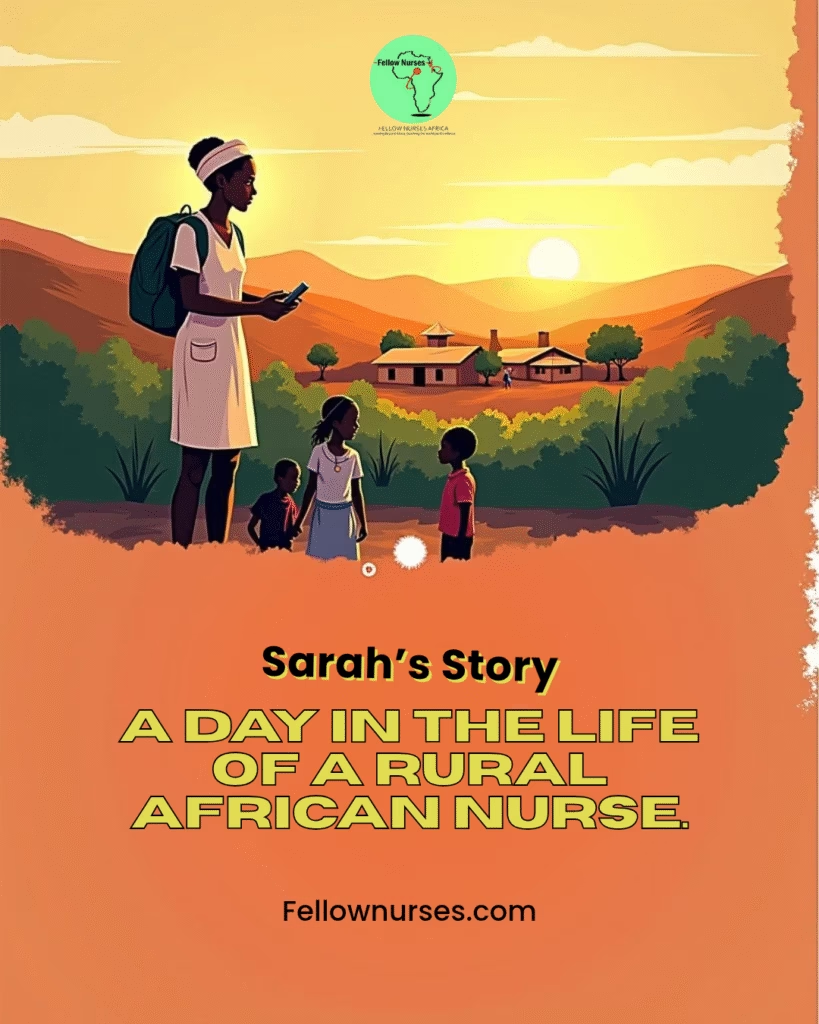Written By Ifunanya Stella Ndu, for Fellow nurses Africa. 19 June, 2025.
In the heart of rural Nigeria, nestled among rolling hills and dusty roads, lives Nurse Sarah Okafor, a woman whose quiet resilience and unwavering dedication have made her a cornerstone of her community’s healthcare. At 32 years old, Sarah has become more than just a nurse; she is a mother, wife, midwife, counselor, health educator, and, for many, a lifeline.
Sarah’s day begins before dawn.

By 5:00 AM, she is already awake, boiling water over a charcoal stove and preparing a modest breakfast for her two children. By 6:00 AM, she mounts her battered motorbike and begins her journey to the village Health Center which is a small government clinic serving over 5000 people scattered across surrounding villages.
The health center is under-resourced and always make use of improvise, but it is the first point of contact for most health concerns. Upon arrival, Sarah is greeted by a long line of patients; pregnant women, mothers with feverish toddlers, and elderly men with chronic ailments. Many of them have walked for hours just to see her.
As the only trained nurse on duty most days, Sarah’s responsibilities are vast. She begins by organizing antenatal visits, checking vital signs, and educating expectant mothers on nutrition and safe delivery. She moves swiftly but attentively, balancing empathy with efficiency.
Around 10:30 AM, a boda boda (motorbike taxi) arrives with an emergency: a young woman in obstructed labor.
The clinic lacks a surgical theater, so Sarah must stabilize the mother before arranging a referral to the nearest district hospital, 40 kilometers away. She administers intravenous fluids, monitors vital signs, and calls the ambulance which is often out of fuel or otherwise unavailable. Today, she’s fortunate: the ambulance is operational. She rides along to monitor the mother’s condition.
Returning to the clinic by 1:30 PM, Sarah eats rice and beans. Her break is short-lived. The afternoon brings an influx of malaria cases. She diagnoses, treats, and records each patient meticulously, adhering to government health protocols.
The clinic’s pharmacy is sparse, malaria rapid diagnostic tests, antibiotics, syringes, and gloves often run out. Sarah sometimes has to improvise or send patients to private pharmacies, knowing many cannot afford the costs. “One of the hardest parts of nursing in a rural African setting,” Sarah says, “is watching someone suffer because they cannot pay for basic medicine.”
Her shift officially ends at 5:00 PM, but Sarah’s work doesn’t. As she heads home, she stops by two households where she conducts follow-up visits; one for a malnourished child, another for a diabetic grandmother. Her presence comforts families, and her knowledge saves lives.
By the time she gets home, the sky is tinged with the soft purple and orange of dusk. She helps her children with homework, cooks dinner, and sometimes attends to a neighbor in need. She writes reports and updates patient logs by candlelight, power outages are common.
Despite the daily challenges, scarce supplies, low pay, long hours, Sarah finds joy in her work. When a baby is born healthy, when a child recovers from malaria, or when a mother thanks you with tears in her eyes, that’s what keeps her going.
Sarah’s commitment extends beyond clinical care. She runs monthly community health talks, educating villagers on hygiene, family planning, and HIV prevention. Her outreach work has significantly increased the number of women seeking antenatal care early in pregnancy, a major public health win in her district.
Sarah is one of thousands of African nurses working in rural settings where health systems are stretched thin. Their role is not only medical but deeply social. They fill the gaps left by infrastructure, inequality, and limited resources.
She dreams of one day opening a fully equipped maternal health center in her community. With the mindset that every mother deserves a safe delivery.
Sarah’s story is a powerful reminder of the vital role nurses play in Africa’s healthcare landscape. She embodies the spirit of resilience, compassion, and service. Though her days are long and her resources few, her impact is immeasurable. Through her dedication, she is not just providing care, she is shaping a healthier future for her community.
In the world of rural African nursing, Sarah is not merely a caregiver she is a HERO IN SCRUB!!





